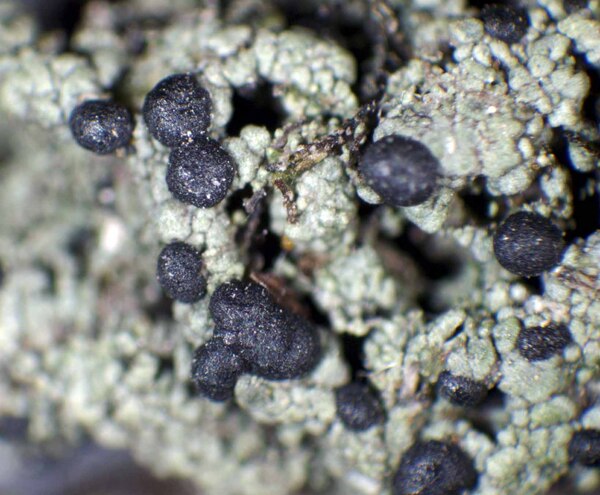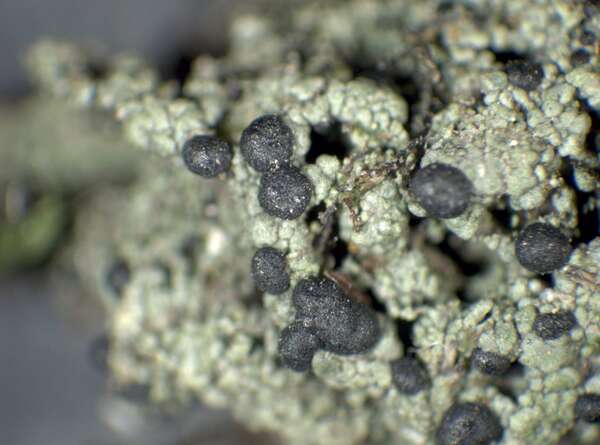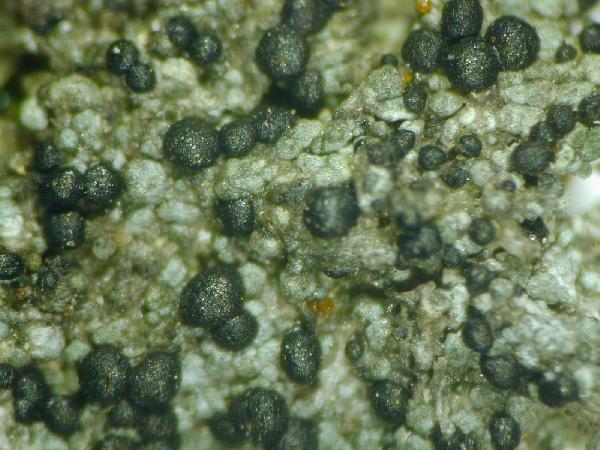Bilimbia accedens Arnold
Flora, 45: 391, 1862.
Synonyms: Bacidia accedens (Arnold) Lettau; Bacidia decedens (Stizenb.) Mig.; Mycobilimbia accedens (Arnold) V. Wirth ex Hafellner; Myxobilimbia accedens (Arnold) Hafellner
Description: Thallus crustose, episubstratic, whitish, farinose-granulose. Apothecia frequent, biatorine, sessile, 0.3-0.7(-0.8) mm across, with a blackish brown to black, initially flat, then rapidly convex disc, and a thin, soon excluded proper margin. Proper exciple well-developed, of stout, radiating hyphae in a gel matrix; epithecium bright to blackish emerald green or olive-green, K-; hymenium colourless, >60 µm high, I+ blue; paraphyses coherent, mostly simple, 2-3 μm thick at mid-level, the apical cells up to 5(-6) μm wide; hypothecium reddish brown at least in upper part. Asci 8-spored, cylindrical-clavate, with a K/I+ blue apical dome penetrated by a narrow, K/I– apical cushion surrounded by an indistinct, apically often tapering, wall K/I– but surrounded by an I+ red-brown, K/I+ blue outer layer. Ascospores (5-)7-9(-10)-septate, hyaline, ellipsoid-cylindrical, 20-45 x (5-)6-7(-9) µm. Photobiont chlorococcoid. Spot tests: thallus K-, C-, KC-, P-, UV-. Chemistry: without lichen substances.
Growth form: Crustose
Substrata: soil, terricolous mosses, and plant debris
Photobiont: green algae other than Trentepohlia
Reproductive strategy: mainly sexual
Commonnes-rarity: (info)
Alpine belt: rare
Subalpine belt: rare
Montane belt: rare
Dry submediterranean belt: absent
Humid submediterranean belt: absent
Padanian area: absent
pH of the substrata:
1 2 3 4 5
Solar irradiation:
1 2 3 4 5
Aridity:
1 2 3 4 5
Eutrophication:
1 2 3 4 5
Poleotolerance:
0 1 2 3
Altitudinal distribution:
1 2 3 4 5 6
Rarity
absent
extremely rare
very rare
rare
rather rare
rather common
common
very common
extremely common
Loading data...
Occurrence data
Predictive map
Growth form: Crustose
Substrata: soil, terricolous mosses, and plant debris
Photobiont: green algae other than Trentepohlia
Reproductive strategy: mainly sexual
Commonnes-rarity: (info)
Alpine belt: rare
Subalpine belt: rare
Montane belt: rare
Dry submediterranean belt: absent
Humid submediterranean belt: absent
Padanian area: absent
pH of the substrata:
| 1 | 2 | 3 | 4 | 5 |
Solar irradiation:
| 1 | 2 | 3 | 4 | 5 |
Aridity:
| 1 | 2 | 3 | 4 | 5 |
Eutrophication:
| 1 | 2 | 3 | 4 | 5 |
Poleotolerance:
| 0 | 1 | 2 | 3 |
Altitudinal distribution:
| 1 | 2 | 3 | 4 | 5 | 6 |
Rarity
absent
extremely rare
very rare
rare
rather rare
rather common
common
very common
extremely common
Loading data...
Occurrence data
Predictive map









